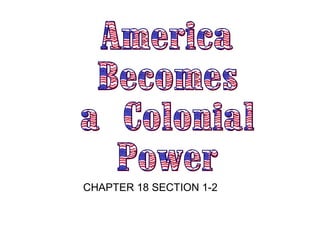
Ch 18 s1 2
- 1. CHAPTER 18 SECTION 1-2
- 2. Imperialism • Imperialism is the quest for colonial empires – Great Britain- “The sun never sets on the British Empire”
- 3. America’s position • Expansionism the need of a nation's expanding its territorial base (or economic influence) usually, by means of military aggression. Isolationism - to have little to do with the political affairs of other nations
- 4. African Imperialism Europe: had colonies for centuries Africa prime target in 19th century Rich in natural resources, provided new markets. Only independent nations in Africa were Liberia and Ethiopia
- 7. 1. Economic Interest1. Economic Interest U. S. Foreign Investments- Need for new market Need for raw materials
- 8. 2. Military/Strategic Interests2. Military/Strategic Interests Alfred T. Mahan- urged US to build naval power to compete with other nation Wanted naval base in Pacific and Caribbean
- 9. 3.3. Social Darwinist ThinkingSocial Darwinist Thinking The Hierarchy of Race- superiority of Anglo- Saxon
- 10. 4. Religious Interest4. Religious Interest To Christianize and civilize the world
- 12. ““Seward’s Folly”: 1867Seward’s Folly”: 1867 Propose to Purchse Alaska from Russia for $7.2 million William H. Seward- Sec. of State
- 13. * Alaska, however, turned out to be rich in fish, gold, copper, timber, oil and coal. The Trans-Alaska Pipelin transports oil, Alaska's most important export.. It runs 800 miles, from the Arctic Ocean to the Gulf
- 15. US 75% of wealth from sugar plantations Plantations owned by Americans Strategic location for a base
- 16. Deposing the Queen Queen Liliuokalani wanted to: end property qualifications for voting Restore power to native Hawaiians
- 17. America takes over The Americans sugar growers : Organized a revolt Overthrew the Queen Sanford Dole became president of Hawaii
- 18. • President Cleveland was an anti-imperialist and refused to annex Hawaii. Uncle Sam and Pres. Cleveland are playing chess with pieces representing the U.S. senators and Queen Lili'uokalani . “His Little Hawaiian Game Checkmated” Uncle Sam: "Grover this game has been too deep for you. Every move you've made has been a blunder, and now you've lost your Black Queen and the game.”
- 19. • Hawaii was annexed in 1898 when President McKinley took office and became the fiftieth state in 1959. “Another Shotgun Wedding” A woman (Hawaii) and Uncle Sam are getting married, kneeling before the minister (Pres. McKinley) who is reading from a book entitled "Annexation Policy". The bride seems ready to bolt.
- 22. Commodore Matthew PerryCommodore Matthew Perry Opens Up Japan: 1853Opens Up Japan: 1853 · Fearing the influence of outsiders, Japan chose to completely isolate itself from other nations in the 1600’s.
- 23. 2. FUEL – to purchase fuel (coal) Why did the U.S. want to establish a relationship with Japan? 1. TRADE – to sell U.S. goods to Japanese consumers Reasons: - Perry arrived with four steam- powered warships, impressing the Japanese.
- 24. • The Treaty of Kanagawa - U.S. received all of their demands from the Japanese. • Perry returned to Japan in 1854 with twice as many ships. Commodore Perry Meeting the Imperial Commissioners at Yokohama Dinner Given to the Japanese Commissioners Aboard the U.S.S.F. Powhatan
- 25. · Japan realized that they needed to become more modern and industrialized. Effects on Japan In 1860, Japan sent their first steam powered warship, the Kanrin Maru to the United States in order to show the world that Japan had mastered Western navigation techniques and ship technologies.
- 28. Jingoism • exaggerated and aggressive national pride, more warlike
- 29. The Imperialist TailorThe Imperialist Tailor
- 32. Spanish Misrule in CubaSpanish Misrule in Cuba
- 33. General Valeriano Weyler – Spanish governor of Cuba used brutal tactics against the Cubans. He was responsible for detaining over 500,000 Cubans and killing over 100,000. * Americans sympathized with the Cuban desire for freedom.
- 34. · President McKinley sent the battleship Maine to Cuba to protect American citizens and property. · US citizens owns sugar plantations in Cuba
- 35. · An explosion destroyed the Maine killing 260 U.S. sailors.
- 36. ““Yellow Journalism”Yellow Journalism” Joseph Pulitzer William Randolph Hearst An exaggerated headlines or stories in the newspapers · Joseph Pulitzer once stated, “You supply me the photos, I’ll supply you the war.” • “Remember the Maine! To hell with Spain!”
- 37. - President McKinley, however, wanted to avoid war with Spain.
- 38. · Spain was accused of destroying the Maine, even though it has never been proven. · On April 25, 1898, Congress declare War on Spain
- 40. The Spanish-American War (1898):The Spanish-American War (1898): “That Splendid Little War”“That Splendid Little War” Fighting starts in Philippines- major Spanish fleet located
- 41. U.S. soldiers in a trench near Manila, the Philippines, during the Spanish – American War. (1898)
- 42. · Commodore George Dewey defeated the Spanish navy in the Philippines after only six hours of battle. Spanish-American War (1898) The Philippines Commodore George Dewey (1837-1917)
- 43. Commodore George DeweyCommodore George Dewey Destroy the Spanish fleet in Manila BayDestroy the Spanish fleet in Manila Bay
- 44. US – attack in the Caribbean IslandUS – attack in the Caribbean Island US- Invaded Cuba
- 46. Rough Riders • What famous Battle did they participate in? •San Juan Hill- ended Spanish rule in Cuba
- 47. Results •US defeats Spain & becomes a world power •US must decide what to do about its newly won colonies (Phillipines, Puerto Rico, and Cuba, Guam)
Notes de l'éditeur
- Other nations were establishing global military presence. US built nine steel-hulled cruisers and construction of modern battleships (Maine)